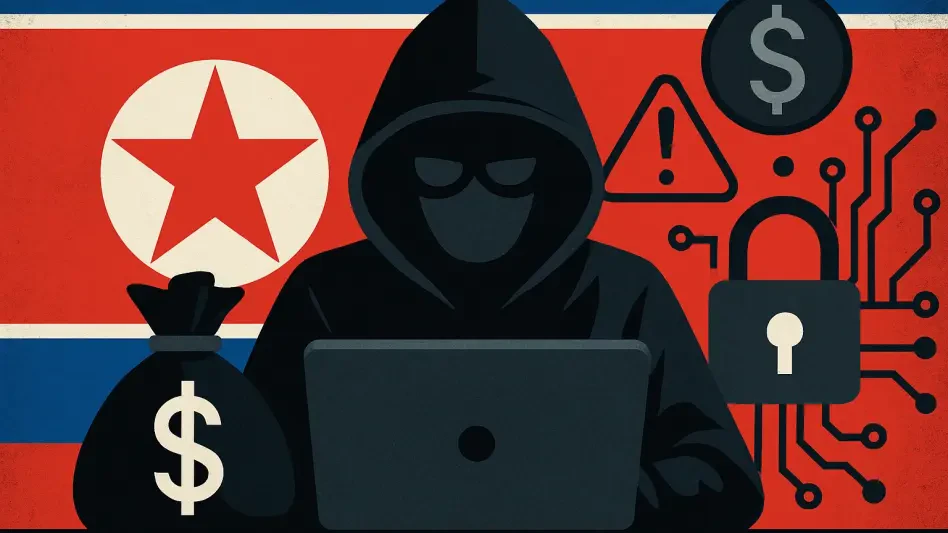What happens when a rogue state turns the internet into a weapon, stealing billions to fuel nuclear ambitions? North Korea has mastered this shadowy game, pulling off cyber heists that have netted over $3 billion in cryptocurrency in recent years, a staggering figure that serves as a wake-up call about a hidden war being waged in the digital realm, prompting the United States to hit back with razor-sharp sanctions aimed at cutting off the financial arteries of a defiant regime.
The significance of this issue cannot be overstated. North Korea’s cybercrimes are not mere thefts; they directly bankroll a nuclear weapons program that threatens global stability. With illicit funds flowing through sophisticated networks of hackers and fraudulent IT workers, the stakes for international security are sky-high. The U.S. response, through targeted sanctions, seeks to dismantle these operations, making this a critical moment for governments and tech industries worldwide to confront a growing menace.
Exposing the Cyber Shadow: North Korea’s Digital Crime Surge
North Korea’s rise as a cybercrime powerhouse is a chilling reality. State-sponsored hackers have exploited vulnerabilities in global tech systems, targeting cryptocurrency exchanges and digital wallets with ruthless precision. Reports from the U.S. Treasury Department highlight that these operations have become a cornerstone of the regime’s funding strategy, generating massive revenue to evade international restrictions.
Beyond the headlines of stolen billions, the intricacy of these schemes reveals a calculated effort. Cyberattacks attributed to groups like the Lazarus Group have hit major financial institutions and crypto platforms, often using ransomware and phishing tactics. This digital plunder isn’t random—it’s a deliberate move to sustain a government isolated by decades of sanctions.
The scale of the problem continues to grow, with estimates suggesting that North Korean cyber operatives are expanding their reach. Their ability to adapt to new technologies and exploit gaps in cybersecurity poses a persistent challenge. As these threats evolve, the urgency to counter them with robust measures becomes even more apparent.
A Global Security Alarm: Why These Cyber Schemes Threaten Everyone
The implications of North Korea’s cyber activities ripple far beyond stolen funds. Every dollar siphoned through digital theft or IT worker fraud feeds into a nuclear program that defies United Nations Security Council resolutions. This direct link between cybercrime and weapons development transforms a tech issue into a geopolitical crisis affecting nations across the globe.
Financial systems, businesses, and even individual users are at risk as these illicit operations target a wide array of sectors. The Treasury Department has noted that IT worker schemes, where North Korean operatives pose as legitimate freelancers, have generated hundreds of millions by deceiving companies worldwide. Such fraud not only undermines trust in digital economies but also funnels resources toward dangerous state objectives.
International concern is mounting as the audacity of these actions becomes clear. The potential for destabilization grows with every successful heist, pushing governments to prioritize cybersecurity as a matter of national defense. This isn’t just about money—it’s about safeguarding a world order that hangs in a delicate balance against unchecked aggression.
Inside the U.S. Counterstrike: Sanctions on Key Players
The U.S. has rolled out a hard-hitting response, sanctioning eight individuals and two entities directly tied to North Korea’s illicit financial networks. Among the targets are Jang Kuk Chol and Ho Jong Son, bankers linked to First Credit Bank, accused of managing cryptocurrency funds derived from cyber theft. These designations aim to sever critical links in the regime’s money laundering chain.
Also in the spotlight are companies facilitating these schemes. Korea Mangyongdae Computer Technology, operating IT worker delegations from China, and Ryujong Credit Bank, aiding sanctions evasion, have been hit with restrictions. Additional individuals based in China and Russia, including Ho Yong Chol and Han Hong Gil, face asset freezes for their roles in enabling illicit transactions, showcasing the global scope of this network.
These sanctions are a strategic effort to disrupt specific cogs in a sprawling machine. By isolating key figures and firms from international financial systems, the U.S. hopes to choke off the revenue streams that fuel North Korea’s ambitions. This targeted approach sends a clear message: no corner of this operation is beyond reach.
Voices of Authority: Global Experts Weigh In
Treasury Undersecretary John Hurley has been vocal about the severity of the threat, labeling these sanctioned actors as direct risks to U.S. and international security. His statements underscore a critical point—the funds stolen through cyber means are not petty cash but lifelines for Pyongyang’s nuclear pursuits. This perspective drives home the urgency of collective action.
A multinational report, supported by allies from Europe and Asia, paints an equally grim picture. It describes North Korea’s cyber capabilities as a sophisticated national program, rivaling those of major powers like China and Russia. The consensus among experts is that cryptocurrency theft and laundering are not just crimes but calculated strategies to undermine global peace.
Analysts stress that the international community must unite to address this challenge. The shared understanding among nations highlights a rare alignment on the need for tougher measures. As one cybersecurity expert noted, countering these threats requires not just sanctions but a coordinated overhaul of how digital vulnerabilities are managed worldwide.
Dissecting the Strategy: How Sanctions Aim to Break the Funding Cycle
U.S. sanctions operate on multiple fronts to cripple North Korea’s cybercrime revenue. Asset freezes and transaction bans isolate targeted individuals and entities from global markets, effectively locking them out of legitimate financial systems. This tactic seeks to render their illicit gains unusable, striking at the heart of their operations.
Another layer involves deterring third-party enablers in countries like China and Russia. Penalties for facilitating sanctions evasion aim to close loopholes exploited by North Korean operatives. By raising the cost of complicity, the U.S. pressures intermediary nations and businesses to cut ties with these networks, shrinking the regime’s operational space.
Finally, these measures serve as a warning to tech and financial sectors to bolster defenses against North Korean tactics. From IT worker fraud to crypto theft, the call is for heightened vigilance and better safeguards. This multi-pronged strategy not only disrupts current funding but also aims to prevent future schemes, laying groundwork for broader international collaboration.
Looking back, the battle against North Korea’s cybercrime empire unfolded as a stark reminder of the digital age’s darker side. Reflecting on the efforts, it became evident that sanctions alone weren’t enough; they had to be paired with innovation in cybersecurity and global partnerships. Moving forward, nations and industries needed to invest in cutting-edge defenses, share intelligence more effectively, and stay ahead of evolving threats. Only through such sustained, collective resolve could the world hope to neutralize the risks posed by state-sponsored digital heists and secure a safer future.








